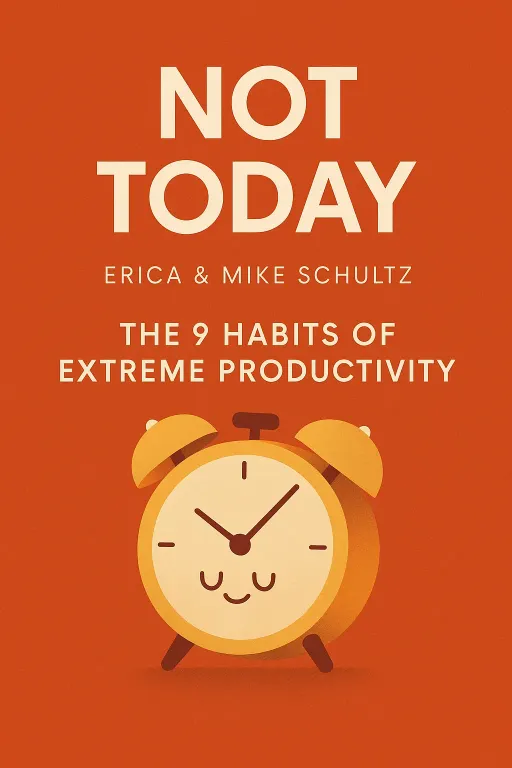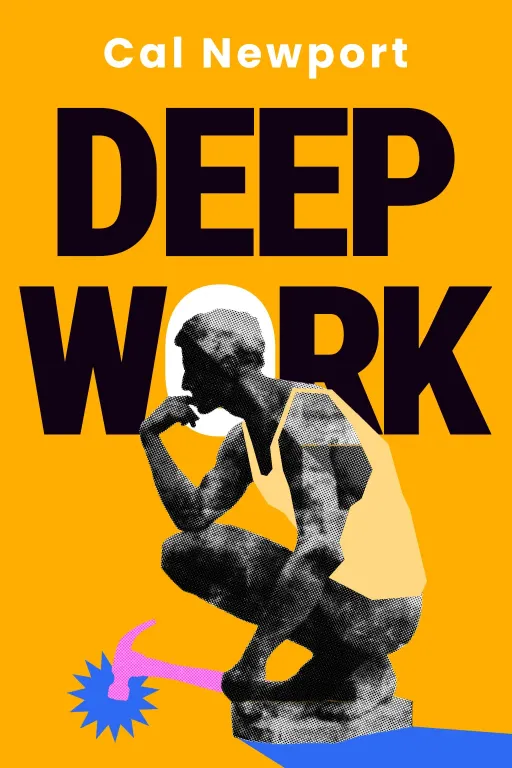
Productivity Born from Crisis
9 minThe 9 Habits of Extreme Productivity
Golden Hook & Introduction
SECTION
Mark: The average person, right now, is throwing away more than half of their workday. 4.3 hours, every single day, gone. Poof. Michelle: Wait, 4.3 hours? That's... that can't be right. That's more than a flight from New York to Dallas. Every day? On what? Mark: On things that don't matter. On tasks that could be delegated, or worse, on pure, empty, wasted time. And that's the question at the heart of the book we're diving into today: Not Today: The 9 Habits of Extreme Productivity by Erica and Mike Schultz. They argue we don't even realize what we're wasting until we're faced with a deadline we can't extend. Michelle: And their story behind that is... incredibly intense, right? This isn't your typical productivity guru book. It’s received really strong, if sometimes mixed, reviews precisely because of that. Mark: Not at all. The entire framework was forged while they were balancing running their business and caring for their son, Ari, through a critical, years-long heart condition. It’s a book born from crisis. And you can feel that tension in the authorship—Mike comes from a world of sales and data-driven research, while Erica is actually an accomplished comic book writer. Michelle: A comic book writer? Wow. Okay, that explains the blend of hardcore data and profound storytelling. So how does a family tragedy become a manual for extreme productivity? That feels like a huge leap.
The 'Not Today' Philosophy: Forging Productivity from Pain
SECTION
Mark: It's the central, powerful idea of the book. Before their son's illness, the authors lived by a pretty common formula: Effort equals Achievement equals Happiness. You work hard, you get the promotion, you buy the house, you're happy. But when their son Ari was diagnosed with a life-threatening congenital heart defect at an 18-week ultrasound, that formula shattered. Michelle: Of course it would. Happiness is suddenly off the table when you're facing something like that. Mark: Exactly. Their life became a blur of hospital stays—over 430 nights in five and a half years—surgeries, and constant, high-stakes care. They were working from hospital lounges, not to get ahead, but to keep their business afloat just to pay for health insurance, which topped three million dollars by the time Ari was two. Productivity became about survival, not success. Michelle: That's a completely different operating system for life. Mark: It is. And the turning point, the moment that defines the whole book, comes from Ari himself. The family had met another family at the hospital whose father, Jack, was sleeping in his car to save money. Deeply moved, Mike and Erica decided to organize a charity golf tournament to help families like Jack's. Michelle: While dealing with all of their own stress? That’s amazing. Mark: But then, just two months before the tournament, Ari was diagnosed with congestive heart failure. He needed a transplant. They considered canceling everything. And their son, Ari, who was just a little boy, overheard them and asked, "If we don’t have the tournament, how will we help Jack get out of the box?" Michelle: Oh, wow. That just... stops you in your tracks. From a child. Mark: It’s devastatingly profound. And that's the 'why' the book is built on. Productivity isn't about optimizing your inbox. It's about finding a reason so powerful that it pulls you through the impossible. Their 'why' became helping others, fueled by their son's own empathy. The title, "Not Today," became their mantra to face adversity, to say 'not today' to giving up. Michelle: That's a beautiful, heartbreaking story. But for the rest of us, how do we find that level of 'why' without a tragedy? Does the book expect us to have that kind of earth-shattering moment to be productive? Mark: That's a fair and important question. They address this with their first habit, "Recruit Your Drive." They argue you don't have to wait for a crisis; you can consciously create your 'why'. You define what they call a "New Reality"—a written, vivid picture of the life you want. It’s not just "I want to be rich." It’s "I want to retire at 55 so I can take my grandkids on adventures and not worry about money." The specificity and the emotional connection are what generate the drive. Michelle: So you're manufacturing your own motivation, essentially. You're building your own 'why' instead of having it forced upon you by circumstance. Mark: Precisely. You're finding your own 'Jack in the box' to fight for.
The TIME Framework: An Audit for Your Soul, Not Just Your Schedule
SECTION
Michelle: Okay, so once you have this powerful 'why,' this driving purpose, where do you go from there? A strong reason to be productive is great, but you still have a day full of emails, chores, and endless meetings. Mark: And that's where their system gets really practical. Once you have your 'why,' you need a tool to align your daily 'what' and 'how.' That's their TIME framework. It’s a way to audit your life. Michelle: I’ve heard of time-blocking and other systems. Some readers have said the habits feel familiar. What makes this one different? Mark: The difference is that it's a value-based system, not just a scheduling one. They ask you to categorize every activity into one of four buckets. T is for Treasured time. This is non-negotiable, soul-filling stuff—playing with your kids, date night, a hobby you love. Michelle: I like that it starts there. Most systems treat that as the reward you get after all the work is done. Mark: Exactly. They argue you must schedule it first. Then comes I, for Investment time. These are the activities that produce outsized returns for your 'New Reality'—learning a new skill, strategic planning, building key relationships. This is where you should spend most of your work energy. Michelle: Okay, Treasured and Investment. That makes sense. What are the other two? Mark: M is for Mandatory. This is the stuff you feel you have to do, but it doesn't really fuel you. Think commuting, TPS reports, mowing the lawn. The goal here is to minimize, automate, or outsource it. And finally, E is for Empty time. Mindless scrolling, channel surfing, complaining. The goal here is elimination. Michelle: That seems straightforward. But what about things that feel like they're in a gray area? Mark: This is where the philosophy comes in. They share a great story about Erica. After a long day at work, the last thing she wanted to do was make school lunches. For her, it was a draining, 'Mandatory' task. Pure drudgery. Michelle: Oh, I know that feeling. The 'second shift' of household chores. Mark: Right. But then she connected it to her 'why'—one of her core values was raising a healthy family. She consciously reframed the task. She started thinking, "I am not just making sandwiches. I am investing in my children's health and teaching them good habits." The task didn't change, but her mindset did. It shifted from Mandatory to Investment. Michelle: I love that. It's not about just getting rid of the task, but about changing its meaning. So 'Mandatory' isn't just 'stuff I hate,' it's 'stuff that doesn't currently align with my 'why'?' And you have the power to change that alignment. Mark: You have the power to re-categorize it. Suddenly, that 20 minutes of making lunches wasn't a tax on her time; it was a deposit into her family's well-being. It’s a powerful way to look at your entire day. Is that meeting an Investment or is it Mandatory? Is this email chain an Investment or is it Empty? Michelle: And that brings us back to the 4.3 hours we waste every day. A lot of that is probably time spent on Mandatory and Empty activities that we just accept as part of life. Mark: Exactly. The authors argue that the Extremely Productive, or 'The XP' as they call them in their research, spend 46% more time on Investment activities and ruthlessly cut down on the Mandatory and Empty stuff. They're constantly auditing their time against their 'why'.
Synthesis & Takeaways
SECTION
Michelle: So it seems the book's real message isn't about becoming a productivity machine, some kind of robot that never wastes a second. It's about using the tools of productivity to build a life that can withstand anything. A life where you're not wasting those 4.3 hours a day because you know exactly what every minute is for. Mark: That's the core of it. The habits, the frameworks—they are all in service of a bigger goal: to live a life that is both effective and deeply meaningful. It’s about saying 'not today' to the trivial distractions, 'not today' to the meaningless tasks, and 'not today' to letting your life just happen to you. Michelle: It's a much more profound take on productivity than just 'get more done.' Mark: It is. And the authors suggest a simple first step for anyone feeling overwhelmed by this. Don't try to adopt all 9 habits at once. Just for one day, track your time. No judgment, just awareness. See where your hours are actually going. Are they Treasured, Investment, Mandatory, or Empty? Michelle: That’s a powerful, and maybe slightly terrifying, exercise. It’s a great question to end on: If you had to categorize your last 24 hours, what would that breakdown look like? And are you happy with that pie chart? Mark: A question worth asking. Michelle: Listeners, we'd love to hear your thoughts. Does this emotional, purpose-driven approach to productivity resonate with you? Find us on our socials and let us know. Mark: This is Aibrary, signing off.









